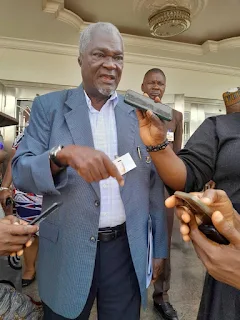Despite that Oyo state is leading in open defecation practice in the southwest, the State government has pledged to intensify efforts and align with its 2022 roadmap to attain open defecation-free (ODF) status by 2028.
In the southwest, Oyo state is leading in open defecation practice with 54 percent of its 8 million population engaging in the act, according to the National Bureau of Statistics. `Ekiti state is the second in the region with 41 percent of the population of the state engaging in open defecation followed by Ondo at 39 percent, Osun at 18 percent, Ogun is 14 percent, while Lagos state is three percent.
The 2021 Water Sanitation and Hygiene National Outcome Routine Mapping (WASHNORM) report also revealed that about 5,020,920 residents, representing 53.7 percent of the total population in Oyo State, practice open defecation, while about 3,621,520, representing 43 percent use unimproved toilet facilities.
The report also disclosed that only 8.4 percent of households have access to basic hand-washing services.
However, Mr. Dotun Oyelade, Commissioner for Information and Orientation, Oyo state told journalists that the government is working hard to end open defecation in the state by 2028.
Oyelade spoke during two-day workshop tagged, “Eliminating Open Defecation in Southwest States Nigeria,” organised by the United Nation’s Children Fund (UNICEF) in collaboration with the Oyo Ministry of Information and Orientation. The workshop began on Wednesday and ended Thursday in Ibadan, Oyo State.
Oyelade said the state government had launched media sensitization and general campaigns against open defecation in the state.
The Commissioner said the state Ministry of Justice had been mandated to ensure the prosecution of perpetrators of open defecation in the state.
“We have started reorientation campaigns with the erection of warning billboards on open defecation in strategic locations in the state.
“After the necessary campaigns, anyone who does not obey the law will be reprimanded.
“The state government is working assiduously to ensure open defecation is reduced drastically by 2028.
“It is very sad that Nigeria has been identified in the whole world as the worst place where open defecation takes place.
“We are happy and encouraged by what UNICEF is doing in collaboration with states to discourage open defecation,” he said.
Photo: Mrs. Titilayo Obayemi, the Director of Oyo State Rural Water Supply and Sanitation Agency (RUWASSA) during her presentation at the two-day workshop tagged, “Eliminating Open Defecation in Southwest States Nigeria,” organised by the United Nation’s Children Fund (UNICEF) in collaboration with the Oyo Ministry of Information and Orientation on Wednesday in Ibadan.
Similarly, Mrs Titilayo Obayemi, the Director of the state’s Rural Water Supply and Sanitation Agency (RUWASSA), said the state government had in 2022 launched a roadmap on open defecation.
Obayemi said the roadmap would enable the state to plan how the 33 Local Government Areas in the state would be open defecation-free by the year 2028.
She said the practice of open defecation in the state was worrisome and the government was doing everything possible to meet its target of open defecation-free society by 2028.
She said the state government had started working in two local governments, Ona-Ara and Egbeda as pilot local governments to end open defecation.
“We have started mobilisation of the stakeholders on it, we have picked two LGAs with the help of UNICEF and we have been able to trigger some of these communities.
“We have about 800 communities in the two LGAs and we have triggered some of them to be open defecation free.
According to her, the state government is also treating sources of potable water in the communities to prevent incidences of waterborne diseases.
“The state is doing well in access to water, but the aspect of sanitation needs to be taken care of.
“Water is polluted in many of the communities due to lack of sanitation and basic hygiene facilities.
“We have a water safety plan. Through this plan, communities’ water sources are being treated to reduce incidences of waterborne diseases,” she said.
Obayemi commended the United UNICEF and WaterAid for their support for Water, Sanitation, and Hygiene (WASH) in the state.
According to her, UNICEF and WaterAid have been helping in capacity building for state and local government staffers on WASH communities’ formation, training, and WASH in schools.
She urged the media to support the state government in the area of public sensitisation on regular hand washing and general sanitation.





